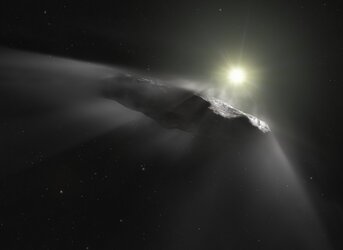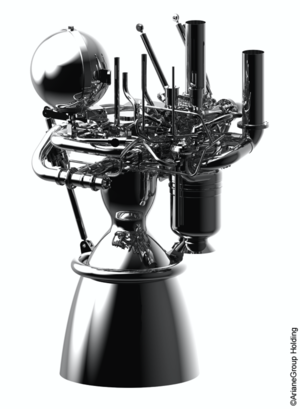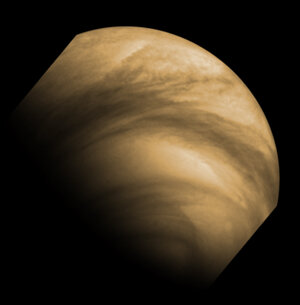Signed and sealed: Envision can move towards construction
On 28 January 2025, the European Space Agency (ESA) awarded a contract to Thales Alenia Space (TAS) to build the Envision spacecraft. Launching in the 2030s, Envision will be the first mission to investigate Venus from its inner core to its upper atmosphere. It will investigate what made our most Earth-like neighbour turn out so different from our home planet.
The contract signing, which took place at the 17th European Space Conference in Brussels, Belgium, kicks off the industrial development of the mission. In collaboration with the Envision team, TAS will now finalise the spacecraft design and begin its construction.

“We are extremely proud to announce our contribution as prime contractor to ESA's Envision mission, twenty years after the historic Venus Express mission,” says Giampiero Di Paolo, CEO of Thales Alenia Space Italia. “Thanks to our long-standing experience on complex scientific missions, we are determined to support this crucial planetary mission, which promises to further our knowledge of our Solar System.”
Prof. Carole Mundell, ESA's Director of Science, adds: “We are thrilled to partner with Thales Alenia Space on this groundbreaking new mission to Venus. No other mission has ever attempted such a comprehensive investigation of our remarkably inhospitable neighbour. Envision will answer fundamental questions about how a planet becomes habitable – or the opposite.”
Why go to Venus?
Venus is the most Earth-like of the Sun’s terrestrial planets in terms of its size, composition and distance from the Sun. It may even have had a relatively Earth-like climate in its distant past.
Yet at some point in planetary history, the two started to evolve very differently. Venus today has a crushingly dense, toxic atmosphere and a surface that is far too hot to host liquid water. Hence, Venus provides a natural laboratory for studying how habitability – or the lack of it – evolved in the Solar System.
Europe's last mission to Venus – ESA's Venus Express – ended in 2014. It focused on the planet’s atmosphere, but also made dramatic discoveries that pointed to possible volcanic hotspots on the planet’s surface.
Following up on Venus Express's discoveries, Envision will investigate the planet’s surface, interior and atmosphere with unrivalled accuracy, allowing us to understand how these different layers work and interact with each other.
Notes for editors
Envision is an ESA-led mission in partnership with NASA. NASA is expected to provide the VenSAR (Synthetic Aperture Radar) instrument, as well as Deep Space Network support. The other payload instruments are contributed by ESA member states, with ASI, DLR, BelSPO, and CNES respectively leading the procurement of the Subsurface Sounding Radar (SRS) and the VenSpec-M, VenSpec-H and VenSpec-U spectrometers. The radio science experiment is led by France with contributions by Germany.
Envision will join ESA’s science fleet of Solar System explorers. These missions address two top-level science themes of ESA’s Cosmic Vision 2015–2025, namely: What are the conditions for planet formation and the emergence of life? and How does the Solar System work?
For more information, please contact:
ESA Media Relations
media@esa.int















 Germany
Germany
 Austria
Austria
 Belgium
Belgium
 Denmark
Denmark
 Spain
Spain
 Estonia
Estonia
 Finland
Finland
 France
France
 Greece
Greece
 Hungary
Hungary
 Ireland
Ireland
 Italy
Italy
 Luxembourg
Luxembourg
 Norway
Norway
 The Netherlands
The Netherlands
 Poland
Poland
 Portugal
Portugal
 Czechia
Czechia
 Romania
Romania
 United Kingdom
United Kingdom
 Slovenia
Slovenia
 Sweden
Sweden
 Switzerland
Switzerland































